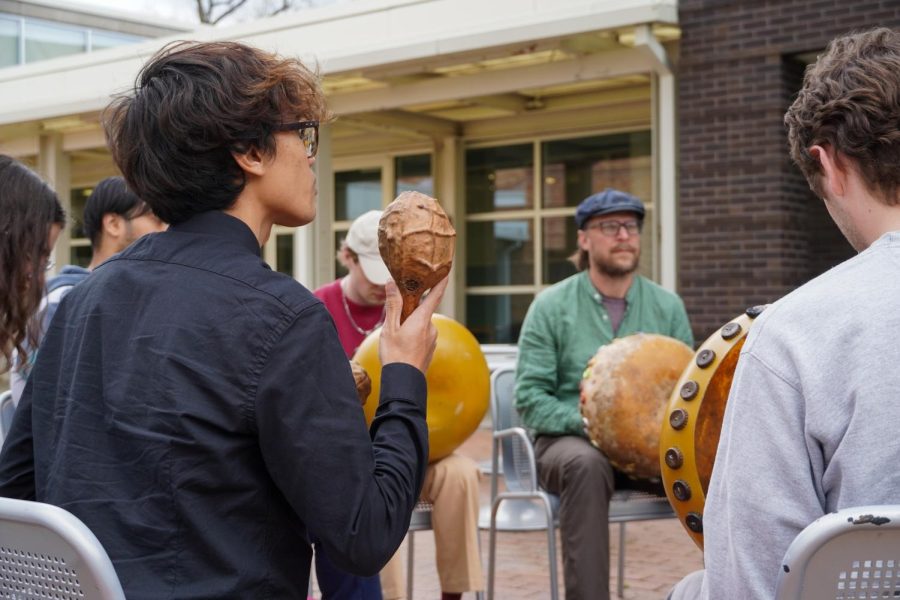Spotlight on Zimbabwean Mbira Ensemble
The Zimbabwean Mbira Ensemble practicing in the Bucksbaum Haight Courtyard.
April 28, 2023
One musical group on campus centers around a single instrument. The Zimbabwean Mbira Ensemble provides students, faculty, staff and community members with the opportunity to not only learn the mbira, but also to experience and share in a collective musical space.
“The music is a vehicle for shaping this potentially profound, potentially transformative shared experience,” said Tony Perman, director of the Mbira Ensemble and assistant professor of music at Grinnell College.
Perman specializes in the music of Zimbabwe and the semiotics of music and emotion. He started the ensemble when he first came to work at Grinnell.
“I think it offers something about how to relate to other people in other parts of the world that are hard to get from a book,” he said.
In addition to the creation of collective experience as a motivation for directing the ensemble, Perman also said that there is importance in “connecting students to this musical history from Zimbabwe that is a deeply complex art form with 1,000 years of history in order to shape those kinds of experiences that is maybe unfamiliar to most of us through the classroom doors.”
Shabab Kabir `26 said that when they joined the ensemble, they realized the collective and participatory nature of the music is different from the other ensemble groups. “I feel like if I make a mistake, I can move on,” Kabir said.
This year, the ensemble has 10 members: five students, two faculty and three community members. Perman said that the four aspects of the mbira style that the ensemble focuses on, which specifically come from the Shona community in Zimbabwe, involve playing the mbira itself, keeping the beat with hosho gourd rattles, dancing and singing. He said that historically, “it emerged really closely tied to ancestral spirits and other kinds, so it’s played in ceremonies for spirits that are, like, all-night parties basically.”
The mbira instrument itself is a hand-held wooden board with metal keys, played with one’s thumb and index finger. “It’s a unique instrument to Africa, not to Zimbabwe,” Perman said. “There’s different kinds all across Africa. There’s some in the Americas after the slave trade, but they’re really different. This one [that we play] is very specific to Zimbabwe.”
The director acknowledged his position as a white American academic teaching this particular music style in the context of colonialism and racism in the United States. He said he tries to “get students to reflect on what it means to embody, to step foot into these histories. Once they get into it — most of them get hooked in some way and stick around — and once you do get hooked, then you have to start reflecting on what does it mean for me to do this, and what responsibilities come with this privilege?”
Every year, the Mbira Ensemble brings in a new guest musician from Zimbabwe who has played the music their entire life. “I like to think of myself mostly as just the conduit between students here and the expertise there,” said Perman.
Assistant Professor of Music Putu Tangkas Adi Hiranmayena, who is a member of the group, said that though he was aware of mbira through his studies, he was never able to play it until coming to the College. “It’s just a really good community-building ensemble where there’s no real prerequisites to play. It’s just supposed to just be for us and the community surroundings, not necessarily supposed to be presentational. So, I like that aspect of it.”
Perman said that historically, mbira music is not associated with concerts. The players are “sort of doing work in service of the event so that people can sing and dance and celebrate. It’s hard to do that in a concert because then people are watching them as pressure to perform for those [audiences], whereas the value of the ensemble for me is doing it for yourself as a group,” said Perman. Despite this, the Ensemble has an outdoor concert forthcoming to encourage dance and share their collective musical experience.
The Grinnell Zimbabwean Mbira Ensemble will hold a concert on Wednesday, May 3 at 7:00 p.m. in the Bucksbaum Haight Courtyard outside of the Bucksbaum Center for the Arts.





















































